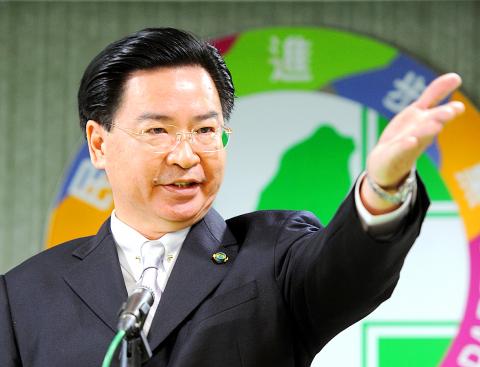Democratic Progressive Party (DPP) Chairman Su Tseng-chang (蘇貞昌) yesterday announced that Joseph Wu (吳釗燮), executive director of the DPP’s Policy Research Committee, will double as the party’s representative to the US, an appointment that has already won praise from the US.
Su told a press conference that since he had assumed the DPP chairmanship, the regional situation surrounding Taiwan had become very dynamic and that consequently, finding the means to strengthen Taiwan’s relations with the US — the nation’s most important ally — had become a key issue for the party.
Su said the party would reopen its representative office in Washington, adding that the first step in that direction was to assign Wu, a former representative to Washington during former president Chen Shui-bian’s (陳水扁) administration, as DPP representative to the US.

Photo: Fang Pin-chao, Taipei Times
Among other tasks, Wu will be responsible for the establishment of the office in the US capital.
“Wu’s performance in Washington [during the Chen administration] was widely appreciated and because he knows both US policy and the DPP’s policies, he is the best candidate to convey the party’s positions to the US side,” Su said.
Because of his responsibilities at DPP headquarters, Wu will not be stationed in Washington, but will visit there regularly, Su said.
Wu said he would not bring domestic politics with him to the US, but would do his utmost to represent the real voices of Taiwanese to Washington.
Wu said that in the future, the party would not only communicate with the US executive branch, but also the US Congress, think tanks and Taiwanese expatriate communities across the US.
Wu said that while he hoped to arrange for Su to visit the US in the near future, the party’s office in Washington had to be operational before this could happen.
The appointment was welcomed within the party.
The DPP must send someone better than President Ma Ying-jeou’s (馬英九) choice of Taipei Economic and Cultural Representative Office representative and former Chinese Nationalist Party (KMT) secretary-general King Pu-tsung (金溥聰), said Lai I-chung (賴怡忠), also a former envoy to the US.
Wu is a capable candidate who is familiar with both the US and China, and will have no problems, Lai said.
Former DPP legislator Kuo Cheng-liang (郭正亮) said it was not common for the opposition party of a nation to have a representative office in another country.
Wu’s role will likely focus on key incidents and issues, and he will be seen more as a “special emissary of the DPP chairperson” rather than a party representative, Kuo said.
However, DPP Legislator Lee Ying-yuan (李應元), a former vice representative to Washington, said the party’s representative to the US should be a full-time job, with the representative stationed permanently in the US.
“Because the job is complicated and the representative also has to deal with the relationships with China, Japan and other countries, the representative should be a full-time job,” Lee said.
Additional reporting by Jake Chung, with CNA

A Ministry of Foreign Affairs official yesterday said that a delegation that visited China for an APEC meeting did not receive any kind of treatment that downgraded Taiwan’s sovereignty. Department of International Organizations Director-General Jonathan Sun (孫儉元) said that he and a group of ministry officials visited Shenzhen, China, to attend the APEC Informal Senior Officials’ Meeting last month. The trip went “smoothly and safely” for all Taiwanese delegates, as the Chinese side arranged the trip in accordance with long-standing practices, Sun said at the ministry’s weekly briefing. The Taiwanese group did not encounter any political suppression, he said. Sun made the remarks when

The Taiwanese passport ranked 33rd in a global listing of passports by convenience this month, rising three places from last month’s ranking, but matching its position in January last year. The Henley Passport Index, an international ranking of passports by the number of designations its holder can travel to without a visa, showed that the Taiwan passport enables holders to travel to 139 countries and territories without a visa. Singapore’s passport was ranked the most powerful with visa-free access to 192 destinations out of 227, according to the index published on Tuesday by UK-based migration investment consultancy firm Henley and Partners. Japan’s and

BROAD AGREEMENT: The two are nearing a trade deal to reduce Taiwan’s tariff to 15% and a commitment for TSMC to build five more fabs, a ‘New York Times’ report said Taiwan and the US have reached a broad consensus on a trade deal, the Executive Yuan’s Office of Trade Negotiations said yesterday, after a report said that Washington is set to reduce Taiwan’s tariff rate to 15 percent. The New York Times on Monday reported that the two nations are nearing a trade deal to reduce Taiwan’s tariff rate to 15 percent and commit Taiwan Semiconductor Manufacturing Co (TSMC, 台積電) to building at least five more facilities in the US. “The agreement, which has been under negotiation for months, is being legally scrubbed and could be announced this month,” the paper said,

Japan and the Philippines yesterday signed a defense pact that would allow the tax-free provision of ammunition, fuel, food and other necessities when their forces stage joint training to boost deterrence against China’s growing aggression in the region and to bolster their preparation for natural disasters. Japan has faced increasing political, trade and security tensions with China, which was angered by Japanese Prime Minister Sanae Takaichi’s remark that a Chinese attack on Taiwan would be a survival-threatening situation for Japan, triggering a military response. Japan and the Philippines have also had separate territorial conflicts with Beijing in the East and South China